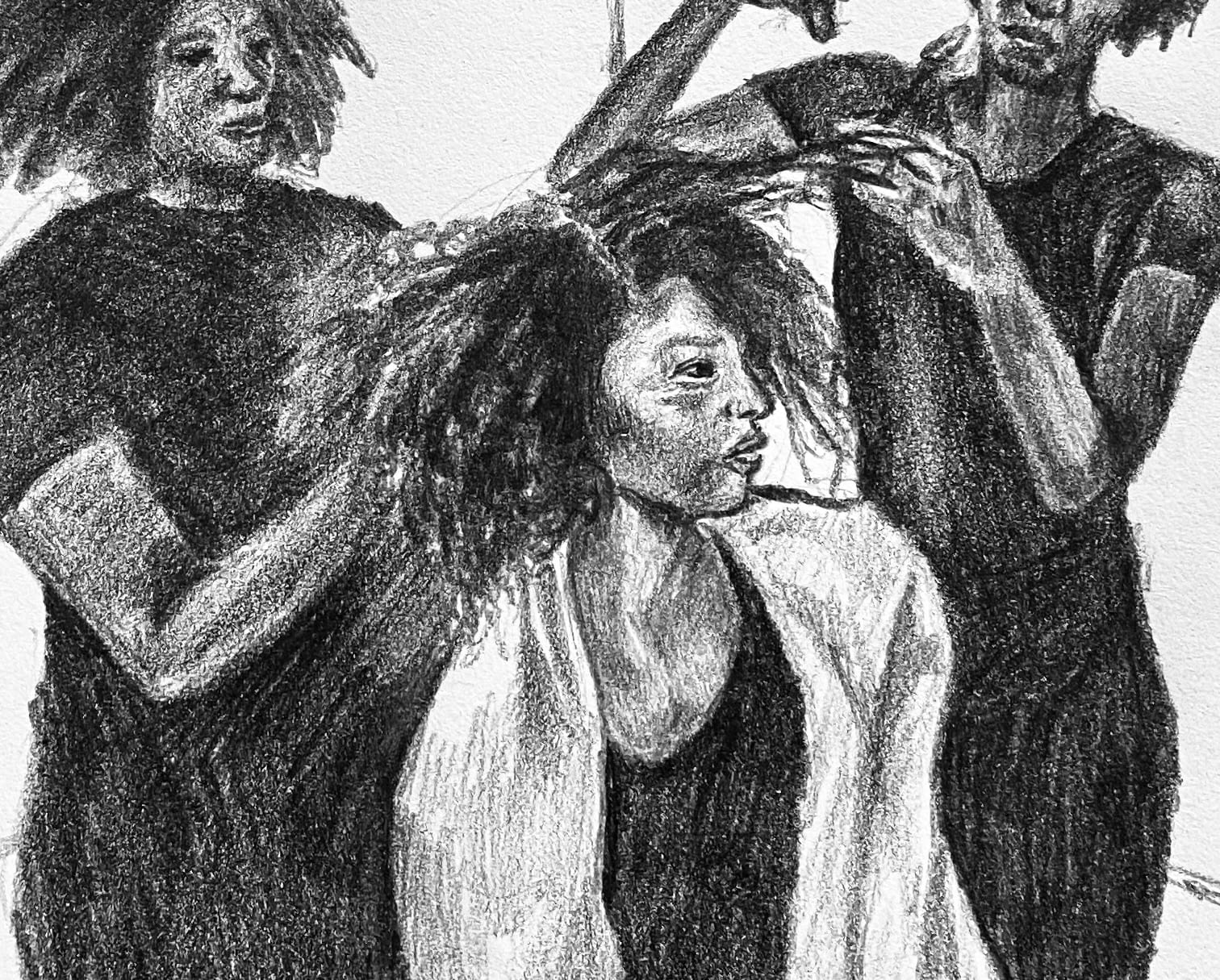By AWA DIOP
The thick branch of the oak tree leans against the narrow second floor window and blocks streams of sunlight from Adja’s African Braiding Salon. The light that seeps through the panes reaches the back of the shop, casting stark white rays against the pink wall. All the stations are empty this morning except for one.
Adja parts the last section of hair with the rattail comb to hook in another box braid. She’s working on the last two braids of Michelle’s hair, a first-time customer. They haven’t talked much past the initial greeting and Michelle explaining her style choice. Adja often prefers silence anyways. Having just come to Harlem from Mali some 6 months ago, she struggles to communicate comfortably with American clients like Michelle. She feels as though they have little in common. Embarrassed by her limited vocabulary and accented English, she’s much less anxious when Sidiki Diabaté’s L’Enfant Beni playing from the TV hooked to the right wall fills up the space.
As Adja separates the Expression braiding hair, she sees her daughter who sits behind her through the mirror. She brought Tima to the salon whenever she wasn’t at Kindergarten. Babysitters were too expensive, and she never really felt safe leaving her baby with anyone but her mom and sisters who were now back home. Tima, who was previously laying on the rug watching some Youtube show on her tablet, was now sitting up with a doll in between her lap teaching Kayla, Michelle’s daughter, how to braid. They both sat concentrated on the mannequin head, the youtube video now playing on the floor as their own background music. They had matching pink and blue bubbles at the end of their plaits. The little name necklace around Kayla’s small neck mirrors the name bracelet on Tima’s wrist.
Kayla intently watches as Tima’s chubby, little fingers part a messy section of the doll’s head. She then separates the section of hair into 3 parts. Tima holds out for Kayla’s hand to gently place on one of the small sections of hair. As Tima holds her two pieces of hair apart from each other, she instructs Kayla to place the piece of hair she’s holding through them. Tima roped her own two over Kayla’s piece to make the first hetch of the plait.
“That’s it! Now you move that,” Tima instructs as she points. Tima had picked up many words at school, and has been stringing together full sentences for the past couple weeks. The curvature of her tongue as she speaks is slightly laced with that of her mother’s language and her English is quite impressive. Kayla circles around her still holding the piece of hair, moving to the direction she pointed to make another layer of the plait. The two girls keep moving around one another, their arms tangling up as they attempt to finish their first braid together. Once done, the plait hung loose and fuzzy. But it held up nonetheless, refusing to untangle.
Meanwhile, Adja asked Michelle, “You like?” Michelle nodded as they both looked into the mirror. “Yes, thank you.” Their eyes trailed from Michelle’s box braids to their little girls in the background. Through the glass, Kayla and Tima appeared as though they were reflections of their own mothers. The longer they stare, the more the little girls themselves were starting to look alike.
“You ready to go, Kayla?” Michelle asks as she hands Adja the folded cash and stands up. Kayla swiftly responds, “Yes mommy,” as she gets up and waves bye to Tima. “Can we stop by Amy Ruth?” Her mother agrees, as she grabs her hand and they make an exit out to the stairwell. On their way out, they walked past a delivery man from “L’Ambassade” bringing up jollof rice to the salon.
Adja tells Tima to go wash her hands to eat.
The mannequin falls off her lap as she gets up, the single braid sticking out. Despite their severing, Kayla and Tima are to be forever connected through that braid. Their handprints scatter across the plait, some overlapping another down the braid. For each hetch, their own bodies bended and conjoined. They braided their differences to cultivate.
They go on to live their lives, distance causing differences in their attitudes and maneuvers. As with their ancestors, they split into different cultures and worlds. Yet, they, too, remained bound with memories each might forget they even have.
Writer | Awa Diop ’26 | adiop26@amherst.edu
Editor | Jihyun Paik ’24 | jpaik24@amherst.edu
Artist | Steven Huang ’24 | sthuang24@amherst.edu
